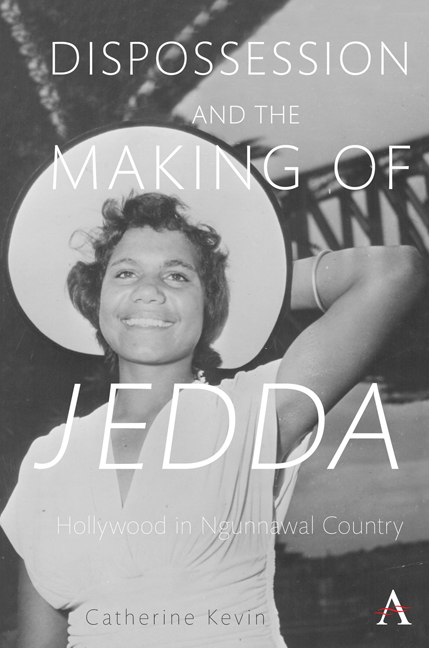Book contents
- Frontmatter
- Dedication
- Contents
- List of Figures
- Acknowledgements
- Introduction: Jedda (1955): Cultural Icon and Shared Artefact of Mid-Twentieth-Century Colonialism
- 1 Financing Jedda
- 2 Hollywood in the ‘Fine Wool Hub’
- 3 Making Jedda
- 4 Viewing Jedda
- Epilogue: Bogolong Memories and the Conceit of Family History
- Index
2 - Hollywood in the ‘Fine Wool Hub’
Published online by Cambridge University Press: 23 February 2022
- Frontmatter
- Dedication
- Contents
- List of Figures
- Acknowledgements
- Introduction: Jedda (1955): Cultural Icon and Shared Artefact of Mid-Twentieth-Century Colonialism
- 1 Financing Jedda
- 2 Hollywood in the ‘Fine Wool Hub’
- 3 Making Jedda
- 4 Viewing Jedda
- Epilogue: Bogolong Memories and the Conceit of Family History
- Index
Summary
Drawing on oral histories, newspaper reports and local and state government archives, in this chapter I home in on the central paradox of this story: the inescapable and ongoing colonial context of the Yass Valley ‘Fine Wool Hub’, whose residents were inspired to invest money, time and resources into a film examining ongoing colonial practices. While these supporters of the Chauvels do not appear to have identified in the emerging story of Jedda something of the tenor of race relations in their own communities, it seems evident to a modern observer that the film portrayed conditions and raised questions that were indeed relevant to race relations close to home. Certainly, some Ngunnawal people read Jedda as a story of the subjugation of Indigenous peoples, including its depiction of Indigenous labour, and some have read it as a story of child removal, connecting their personal knowledge of Indigenous children placed in white families with baby Jedda's adoption.
There were of course some differences between the worlds evoked in Jedda and those of the Yass Valley: the Northern Territory depicted in the film is buffalo country, not sheep country, and the audience can surmise that the Aboriginal inhabitants of Mongala station (of unnamed country and language group) were first exposed to European culture much more recently than those in the Yass Valley. Nevertheless, at the time Jedda was made, the discourses of Indigeneity and the labour relations explored in the film were powerfully present in the lives of Ngunnawal people and the settlers on their land. To better understand these connections, and why they were not seen by settlers at the time, this chapter provides a history of race relations in the Yass Valley, where settler wealth was made on Ngunnawal country. I outline the history of Aboriginal residence, including on Hollywood Reserve (known to many as the mission), child removal, Indigenous men and women's labour and the impact of assimilation and integration policies imposed on Ngunnawal people by the New South Wales Aborigines Protection and Welfare Boards and the relevant Shire Councils between 1930 and 1960. I highlight both public events and, through the intertwined memories and histories of the Julians, a woolgrowing family based at Bogolong station, and the Bells, a leading Ngunnawal family, the more intimate experiences of race relations there.
- Type
- Chapter
- Information
- Dispossession and the Making of JeddaHollywood in Ngunnawal Country, pp. 31 - 56Publisher: Anthem PressPrint publication year: 2020



